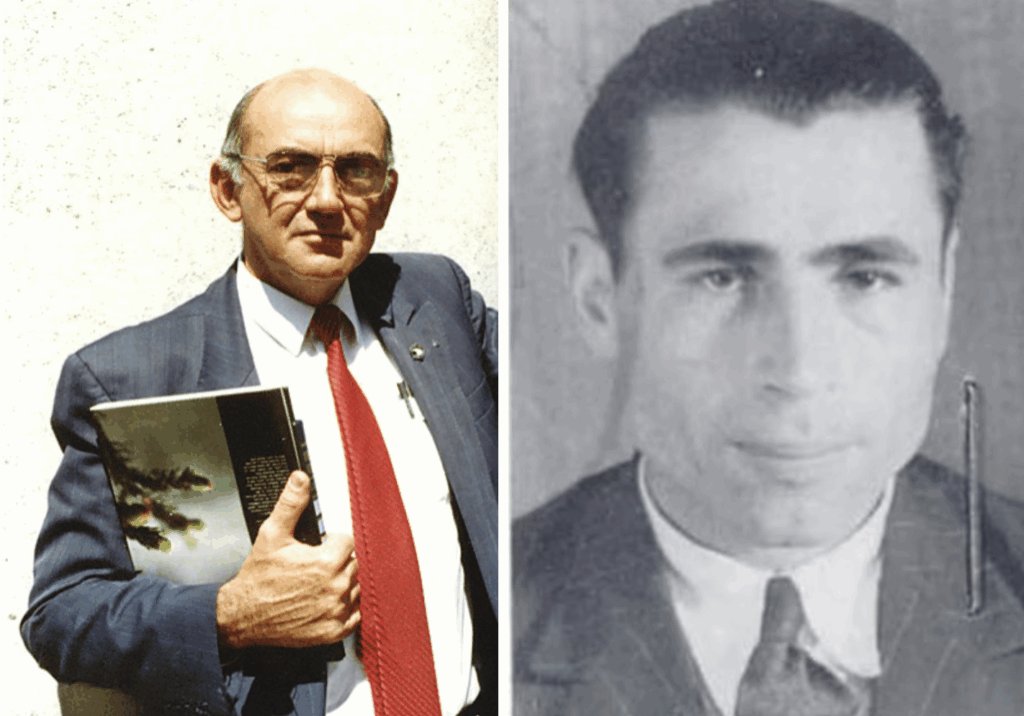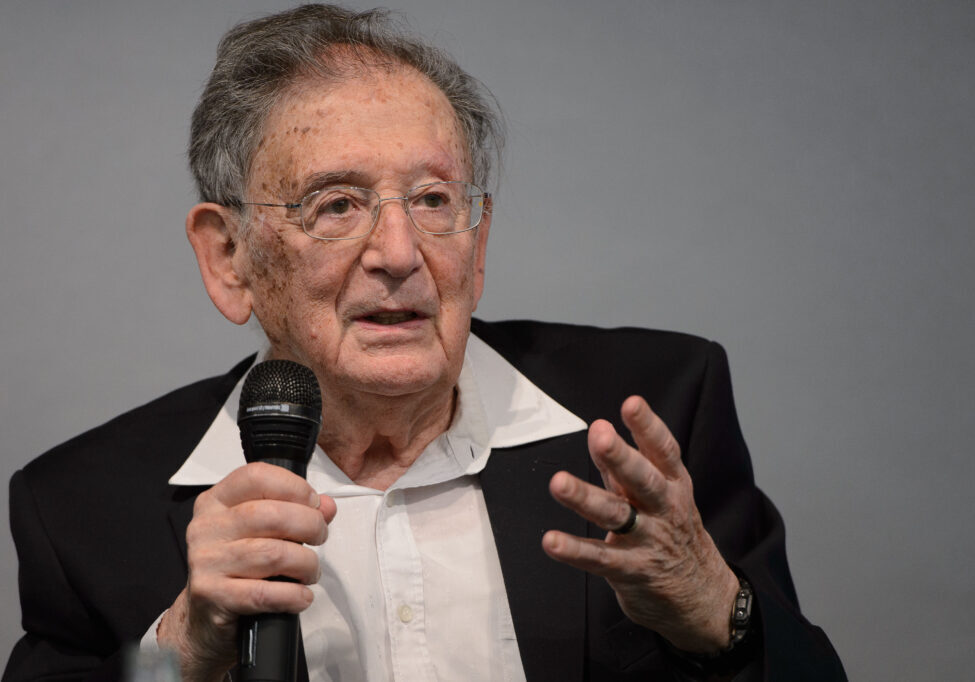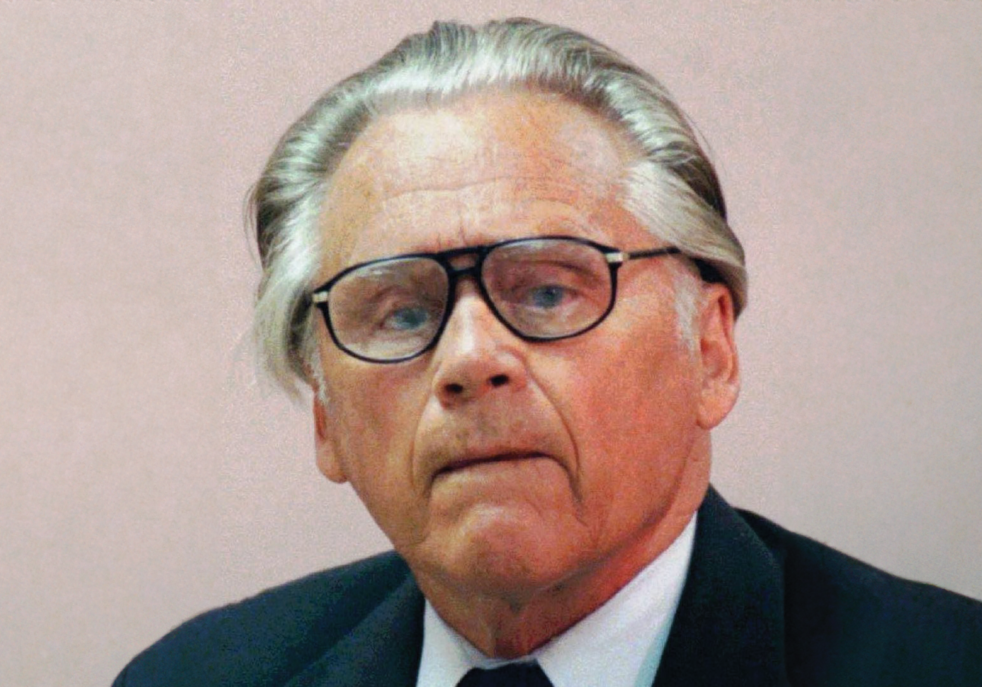Australia/Israel Review
The Biblio File: The Mufti and the Holocaust
May 27, 2008 | John Rosenthal
By John Rosenthal
Der Mufti von Jerusalem und die Nationalsozialisten
by Klaus Gensicke, Wissenschaftliche Buchgesellschaft. 247 pages.
Germany stands for an uncompromising struggle against the Jews. It is self-evident that the struggle against the Jewish national homeland in Palestine forms part of this struggle, since such a national homeland would be nothing other than a political base for the destructive influence of Jewish interests. Germany also knows that the claim that Jewry plays the role of an economic pioneer in Palestine is a lie. Only the Arabs work there, not the Jews. Germany is determined to call on the European nations one by one to solve the Jewish problem and, at the proper moment, to address the same appeal to non-European peoples.
Adolf Hitler to Haj Amin al-Husseini, Mufti of Jerusalem, November 28, 1941.
The persistence of widespread Judeophobia in the Muslim world is hardly a matter of dispute, even if many commentators are inclined to dismiss it as merely an “understandable” reaction to Israeli “oppression”. Among those who take the phenomenon seriously, however, a debate has been taking place of late about its origins. The debate has been spurred on, notably, by the publication in English translation of the German political scientist Matthias Küntzel’s book Jihad and Jew-Hatred: Islamism, Nazism and the Roots of 9/11. The central thesis of Küntzel’s book is that antisemitism – or, more precisely, modern antisemitism as crystallised in the “Jewish world conspiracy” theory – was largely imported into the Muslim world from Nazi Germany.
Now, one might have expected that opponents of Islamism would welcome a book showing the direct influence of the Third Reich upon the development of the Islamist movement and, most notably, on the Muslim Brotherhood, the pivotal organisation in its history. Ironically, however, Küntzel’s book has been most roundly criticised – indeed outright denounced – by precisely the most adamant foes of Islamic extremism. For the most part self-styled experts in Islam, the latter have insisted, as against Küntzel’s thesis, that Muslim antisemitism is, in effect, a strictly Muslim affair.
Haj Amin al-Husseini, the Mufti of Jerusalem and the “father” of Palestinian radicalism, is obviously a key figure for such debates. As is well known, from 1941 to 1945, Husseini lived in Berlin as the honoured guest of Nazi Germany. During this time, he notably collaborated with the Nazis in assembling the Muslim SS division “Handzar” in Bosnia, as well as in numerous propaganda activities aimed at Arab speakers. What is less known, however, is the degree to which the Mufti was influenced by or indeed himself influenced his hosts on an ideological and programmatic level. But a new book by German historian Klaus Gensicke titled Der Mufti von Jerusalem und die Nationalsozialisten – “The Mufti of Jerusalem and the National Socialists” – sheds light on precisely this question. Based largely on primary source materials from the German archives, Gensicke’s volume provides unparalleled insight into the details of the Mufti’s relationship to his Nazi hosts: at least as seen from the German side.
At the very least, Gensicke’s account shows the relationship between the Mufti and the Nazis to have been very much a two-way street: even – or indeed especially – as concerns the notorious “Jewish Question”.
Thus, in March 1933, only two months after Hitler’s appointment as Chancellor, it was in fact the Mufti who sought to contact the new German authorities and not vice-versa. In a March 31 telegram to Berlin, the German General Consul in Jerusalem, Heinrich Wolff, reported on his meeting with Husseini:
The Mufti explained to me today at length that Muslims both within Palestine and without welcome the new regime in Germany and hope for the spread of fascist, anti-democratic forms of government to other countries. Current Jewish economic and political influence is harmful everywhere and has to be combated. In order to be able to hit the standard of living of Jews, Muslims are hoping for Germany to declare a boycott [of “Jewish” goods], which they would then enthusiastically join throughout the Muslim world.
As Gensicke explains, however, the initial German response to the Mufti’s advances was cool. At the time, the Nazi leadership still hoped to come to an understanding with Great Britain that would allow it to pursue unhindered its expansionist goals in Eastern Europe. In return for British acquiescence, it was prepared to treat the Middle East as part of the British sphere of influence.
Moreover, for at least part of the Nazi leadership, the immigration of German Jews to Palestine represented a tolerable solution to Germany’s supposed “Jewish problem”. This attitude was obviously inimical to the plans of the Mufti, who pleaded with German authorities to restrict Jewish immigration. Starting in August 1933, however, they did the opposite: in effect, facilitating Jewish immigration under the complex terms of the so-called Ha’avara (“Transfer”) Agreement. The Ha’avara Agreement simultaneously permitted German Jews to transfer part of their wealth to Palestine and favoured German exports to the region – the latter aspect earning it the support also of the Economics Ministry.
The outbreak of the war brought the Ha’avara Agreement to an end. Even while it was still formally in effect, moreover, the Germans had already been quietly providing financial and material support to the Mufti-led “Arab Revolt” in Palestine from 1936 to 1939. The aim of the revolt was precisely to stop Jewish immigration. After guiding the Arab Revolt from exile in Beirut, the Mufti had in the meanwhile taken refuge in Iraq. There he allied himself with the pro-Axis circle around new Prime Minister Rashid Ali al-Gailani, who had recently replaced the pro-British Nuri as-Said. On Aug. 26, an emissary of the Mufti by the name of Osman Kemal Haddad met with Fritz Grobba of the German Foreign Office in Berlin. According to Grobba’s notes, Haddad asked for a declaration from Germany and Italy recognising the right of the Arab countries to independence and “self-determination” and that they might resolve the “question of the Jewish element” just as Germany and Italy had done. In return, Haddad promised that Iraq would accord Germany and Italy “a privileged place” in its foreign relations: notably as concerns the “exploitation of Iraq’s mineral resources and in particular its oil reserves.”
Gailani would resign his post in January 1941 and then be returned to power by a coup d’état four months later. The British military intervention that followed would bring a provisional end to the Mufti’s plans of transforming Iraq into a pro-Axis beachhead in the Middle East. Both the Mufti and Gailani fled to Teheran toward the end of May. Even after their departure, Gensicke writes, “a wave of acts of intimidation and terror on the part of the pro-Axis forces continued.” These included a major anti-Jewish pogrom, known as the “Farhud”, in which some 179 Iraqi Jews were killed.
As Gensicke’s account makes clear, moreover, the Nazi leadership would continue to accord central importance to the Iraqi “liberation struggle”. Gailani followed the Mufti to Berlin, where he, too, would take up residence starting in November 1941. For the remainder of the war years, the two Arab leaders would compete jealously for the Nazis’ favour.
Hitler appears to have made German plans for a more muscular intervention to “liberate” Iraq merely contingent upon the successful conclusion of Operation Barbarossa, the German invasion of the Soviet Union. The German defeat at Stalingrad in early 1943 definitively put an end to such plans.
On Nov. 28, 1941, three weeks after his arrival in Berlin, the Mufti was received by Hitler. As recorded in the minutes of the meeting, Hitler urged his guest to remain patient:
At some not yet precisely known, but in any case not very distant point in time, the German armies will reach the southern edge of the Caucasus. As soon as this is the case, the Führer will himself give the Arab world his assurance that the hour of liberation has arrived. At this point, the sole German aim will be the destruction of the Jews living in the Arab space under the protection of British power.
In the same meeting, Hitler likewise assured the Mufti of his opposition to the establishment of a Jewish national homeland in Palestine, which, he said, “would be nothing other than a political base for the destructive influence of Jewish interests.” More than 15 years earlier, Hitler had expressed the same thought in more colourful terms in Mein Kampf: “They are not at all thinking of building a Jewish state in Palestine in order, for instance, to live there; but rather they only hope to have a headquarters for their international swindling operations.”
When the right time had come, Hitler told the Mufti, the Arabs and other “non-European peoples” would be called on to “solve the Jewish problem” just as the “European nations” had done. The chilling remark suggests plans to exterminate even those Jews that the Nazi leadership had earlier permitted to immigrate to Palestine. As so happens, historians Klaus-Michael Mallmann and Martin Cüppers have recently uncovered evidence that such plans did indeed exist. A special SS commando unit was formed in 1942 and attached to Rommel’s African Panzer Army. Its writ was in large part identical to that of the infamous Einsatzgruppen that accompanied the Wehrmacht during the invasion of the Soviet Union and that were responsible for the murder of upwards of one million Soviet Jews. On Mallmann and Cüppers’ account, only the defeat of Rommel at the second Battle of El Alamein prevented German forces from entering Palestine and carrying out similar operations against the Jewish population there.
Among his other activities in Berlin, the Mufti served as honorary chair of a newly founded “Islamic Central Institute.” The Institute was officially opened on Dec. 18, 1942. In a letter to Hitler on the occasion, the Mufti expressed the hope that “thousands of Muslims around the world” would cooperate with Germany in the fight against “the common enemies”: “Jews, Bolsheviks and Anglo-Saxons.” The speech given by the Mufti at the opening ceremony provides perhaps the clearest evidence that he required no lessons from the Nazis in antisemitism – or, at any rate, that if he did, he had by this time successfully assimilated those lessons into a remarkable synthesis of “traditional” Koranic and “modern” European Judeophobia:
The Jews and their accomplices are to be counted among the bitterest enemies of the Muslims, who made known… their hostility since ancient times and have everywhere and always… treated them [Muslims] with guile. Every Muslim knows all too well how the Jews afflicted him and his faith in the first days of Islam and what hatefulness they displayed toward the great Prophet – what hardship and trouble they caused him, how many intrigues they launched, how many conspiracies against him they brought about – such that the Koran judged them to be the most irreconcilable enemies of the Muslims… They will always remain a divisive element in the world: an element that is committed to devising schemes, provoking wars and playing peoples off against one another… In England as in America, it is the Jewish influence alone that rules; and it is the same Jewish influence that is behind godless Communism… And it is also this Jewish influence that has incited the nations into this gruelling war. It is only the Jews who benefit from the tragic fate that they [the nations] suffer…
In a subsequent talk at the Islamic Central Institute on Nov. 2, 1943, the Mufti called on Muslims to follow the example of National Socialist Germany, since the latter “knew how to save itself from the evil [Unheil] done by the Jews… It had precisely identified the Jews and decided to find a definitive solution to the Jewish menace, in order to eliminate their evildoing [Unheil] from the world.” Gensicke points to the latter remark as evidence that the Mufti was “well informed” about the extermination program that was by this time long underway in the Nazi death camps in occupied Poland.
Indeed, perhaps the most shocking finding of Gensicke’s research concerns the repeated efforts of the Mufti after 1943 to ensure that no European Jews should elude the camps: this during a period when it was becoming increasingly obvious even to the Nazi leadership that Germany would lose the war. Thus, for example, Bulgarian plans to permit some 4,000 Jewish children and 500 adult companions to immigrate to Palestine provoked a letter from the Mufti to the Bulgarian Foreign Minister, pleading for the operation to be stopped. In the letter, dated May 6, 1943, Husseini invoked a “Jewish danger for the whole world and especially for the countries where Jews live.” “If I may be permitted,” the Mufti continued,
I would like to call your attention to the fact that it would be very appropriate and more advantageous to prevent the Jews from emigrating from your country and instead to send them where they will be placed under strict control: e.g. to Poland. Thus one can avoid the danger they represent and do a good deed vis-à-vis the Arab peoples that will be appreciated.
One week later, the Mufti sent additional “protest letters” to both the Italian and German Foreign Ministries, appealing for them to intervene in the matter. The German Foreign Ministry promptly sent off a cable to the German Ambassador in Sofia stressing “the common German-Arab interest in preventing the rescue operation.” Indeed, according to the post-war recollections of a Foreign Ministry official, “The Mufti turned up all over the place making protests: in the Minister’s office, in the waiting room of the Deputy Minister and in other sections: for example, Interior, the Press Office, the Broadcast service, and also the SS.” “The Mufti was a sworn enemy of the Jews,” the official concluded, “and he made no secret of the fact that he would have preferred to see them all killed.”
As Gensicke points out, the Mufti’s hyperactivity is particularly notable in light of the fact that the Foreign Ministry – and even indeed Heinrich Himmler’s Reich Security Central Office (RSHA), which was directly responsible for implementing the Final Solution – had shown signs of being willing to tolerate the Bulgarian rescue action: at any rate, for a price. The RSHA demanded the release of some 20,000 Germans interred by the Allies in exchange for the Jewish children.
In late June, both the Romanian and Hungarian Foreign Ministers would be recipients of similar appeals from the Mufti. The Romanian government had been planning to allow some 75,000 to 80,000 Jews to immigrate to the Middle East, and Hungary – which had become a refuge for Jews escaping persecution elsewhere in Europe – was reportedly preparing to allow some 900 Jewish children and their parents to immigrate as well. The Mufti repeated his counsel that the Jews should be sent rather to Poland, where they could be kept under “active surveillance”. “It is especially monstrous,” Gensicke concludes, “that el-Husseini objected to even those few cases in which the National Socialists were prepared, for whatever reasons, to permit Jews to emigrate… For him, only deportation to Poland was acceptable, since he knew fully well that there would be no escape for the Jews from there.”
Gensicke suggests that it was Hitler’s belief in the racial inferiority of Arabs that prevented him from fully utilising the support that the Mufti and his Arab nationalist allies could have provided the Nazi cause. Gensicke notes that “on account of their racial ideology, it was impossible for the National Socialists to advocate the idea of Arab independence.” For the Nazis, he concludes, “the Semitic Arabs were as incapable of successfully running a state as were the Jews.” Even leaving aside the biographies of Nazis who would convert to Islam after the war or Himmler’s well-documented (though seemingly rather superficial) enthusiasm for Islam, this well-meaning caveat is contradicted by archival evidence adduced by Gensicke elsewhere in his volume.
If, however, instead of turning to more or less reliable recollections of third parties, one returns to the source – namely, the undisputed bible of the National Socialist movement, Hitler’s Mein Kampf – one discovers that Hitler’s own views on Islam and Arabs were almost nonexistent. In the nearly 800 pages of the two volumes of his would-be magnum opus, Arabs are not mentioned a single time as such and Islam is mentioned just once, in a neutral remark on the relative appeal of Islam and Christianity in Africa. The fevered mental universe of the discharged corporal and aspiring “race theorist” was amply populated by different varieties of Slavs, the occasional “Negro”, and, of course, always and everywhere the conniving and threatening Jew: the racial antipode of the honest “Aryan”. But Arabs and the “Muslim world” seem barely to have crossed his radar. Only once does Hitler implicitly offer his “racial” assessment of the latter: this in considering the prospect of German National Socialists forming an alliance with Egyptian insurgents fighting against British colonial rule. Hitler even alludes tantalisingly to the insurgents’ “Holy War” – in scare quotes, suggesting his clear disdain for the idea. “As [someone] who assesses the value of humanity according to racial criteria,” Hitler writes, “the knowledge of the racial inferiority of these so-called ‘oppressed nations’ forbids me from linking the fate of my own people with theirs.”
It was only during the war that Hitler would, in effect, be confronted in a far more practical and urgent form by the very same question of “linking” the Nazi cause to religiously-tinged Arab nationalism. And when he was, as Gensicke’s volume shows, he would find not only a willing ally, but also a kindred spirit, in Haj Amin al-Husseini.
John Rosenthal writes on European politics, with a special focus on Germany and France. His work has appeared in the Claremont Review of Books, Opinion Journal, Les Temps Modernes, and Merkur. He is a contributing editor for World Politics Review. © Policy Review, reprinted by permission, all rights reserved.
Tags: Holocaust/ War Crimes






